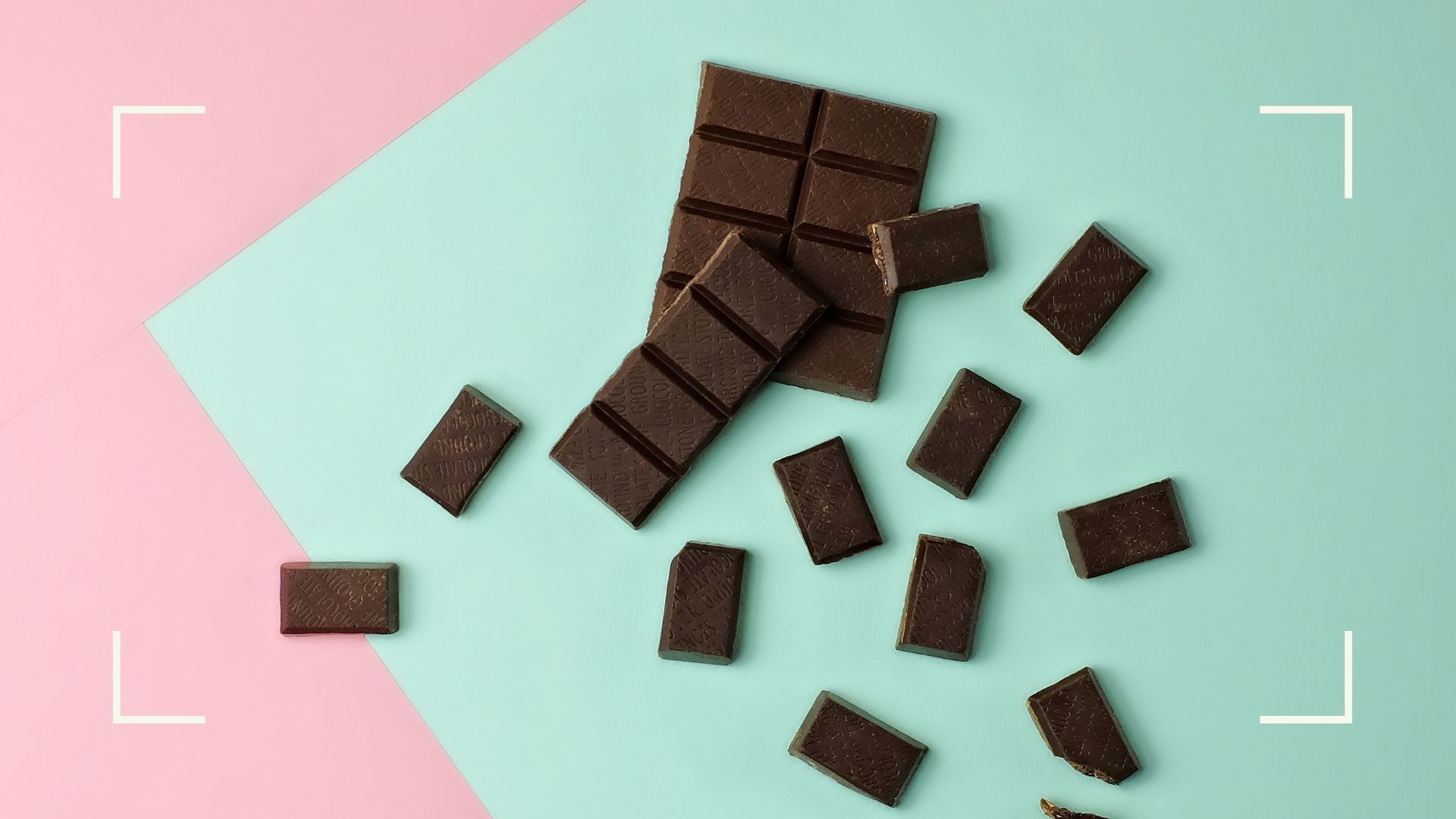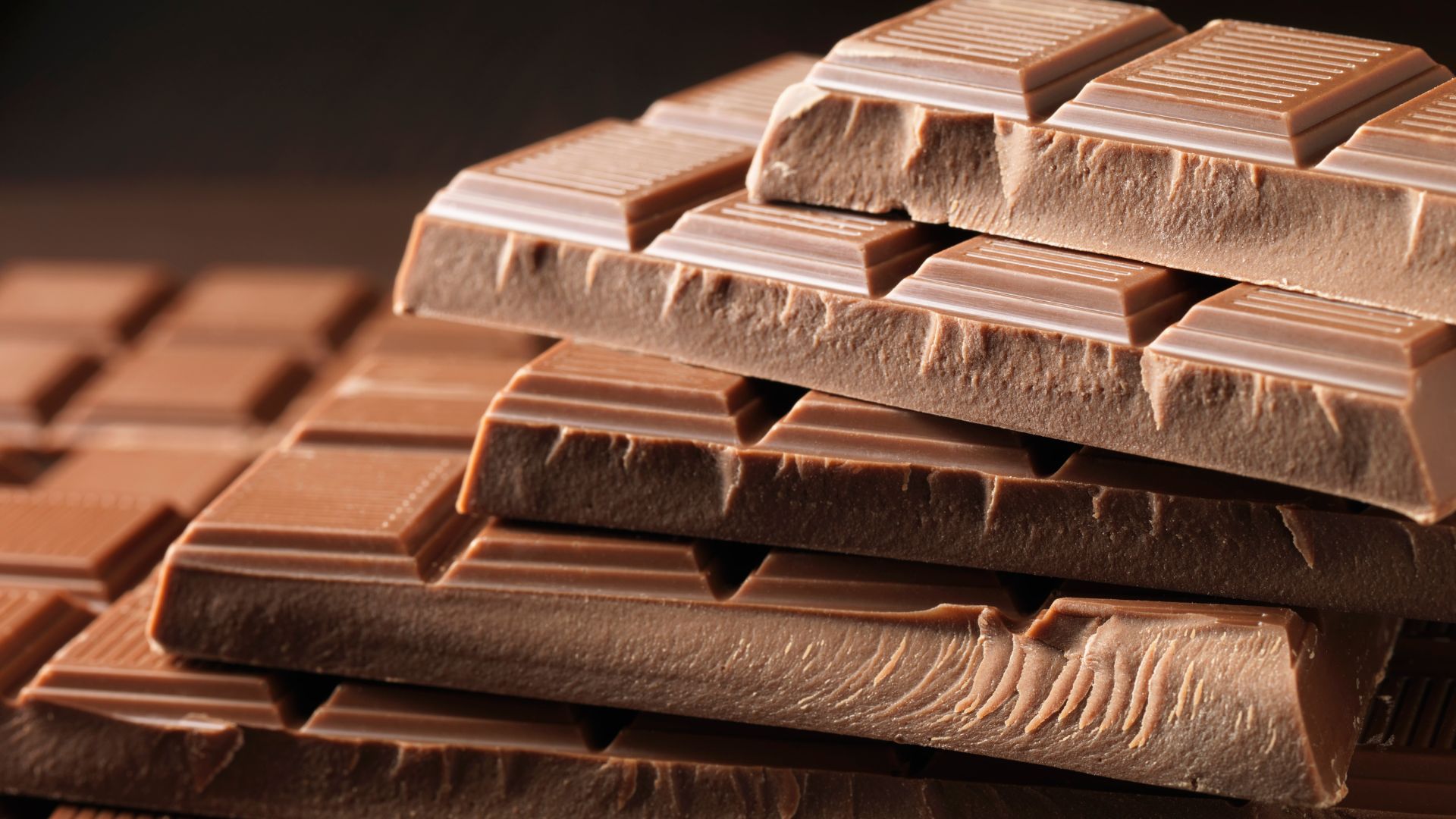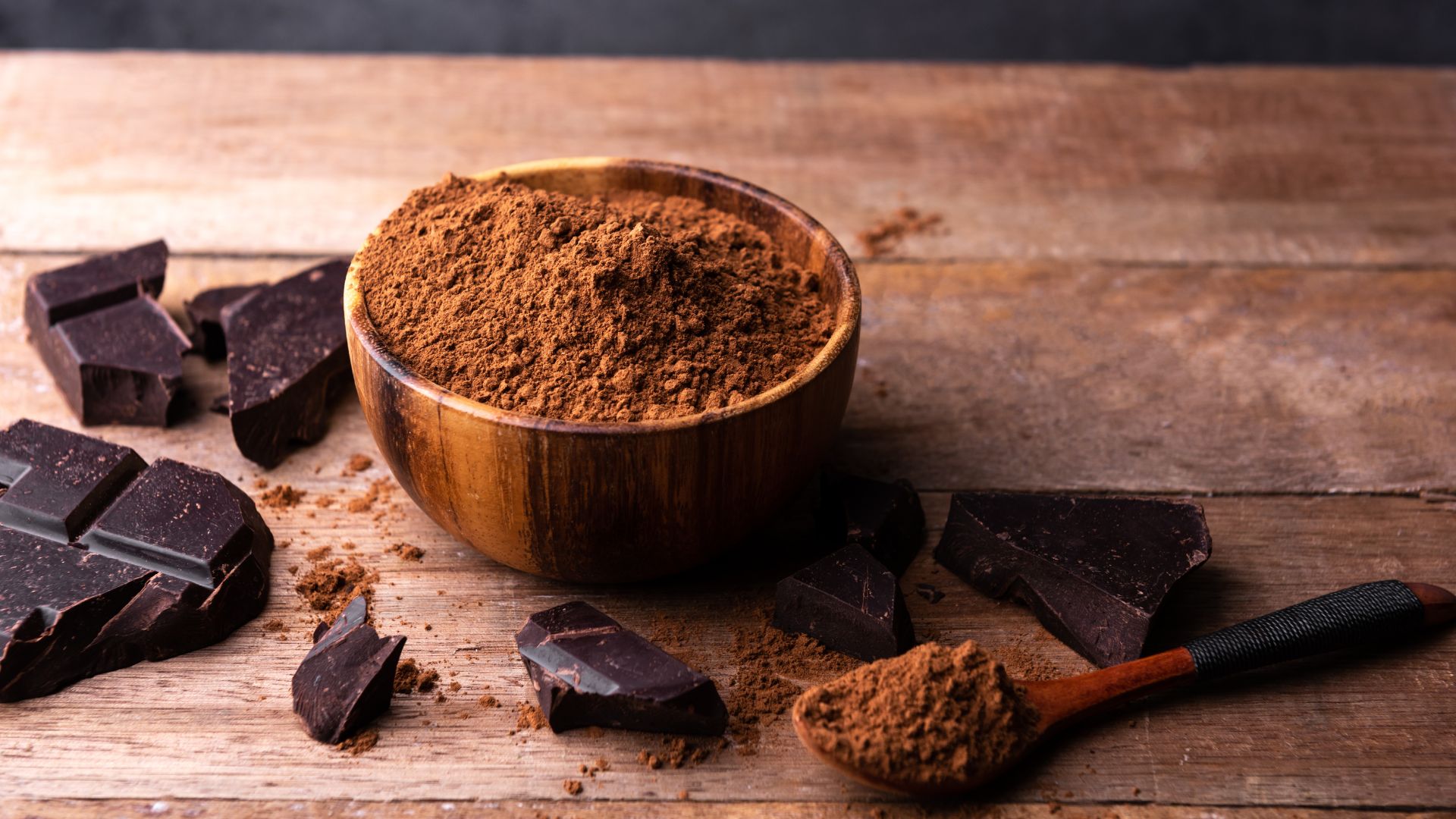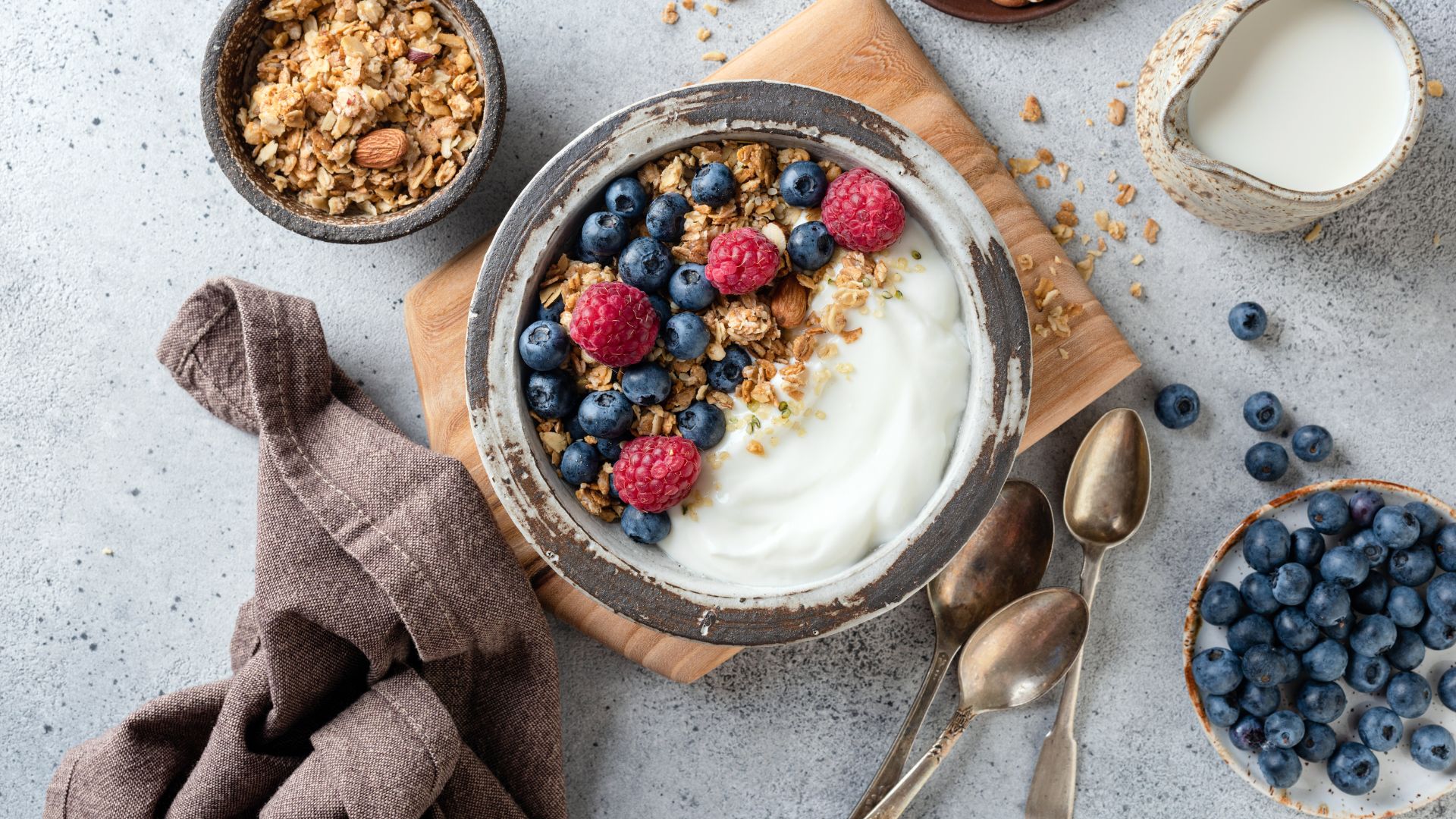How to stop eating chocolate - and the healthy alternatives you can enjoy instead
Whether you want to learn how to stop eating chocolate or just cut back, this is what you need to know


Want to know how to stop eating chocolate? There are plenty of reasons to change our sweet food-habits, from cost-saving in the grocery store to all the associated health benefits of a lower-sugar diet. While there's no doubt that chocolate tastes great in the moment, it tends to lead to a crash by mid-afternoon, leading to fatigue and lethargy.
But giving up chocolate is often painted as an all-or-nothing approach: give it up for good or carry on as normal. With it being such a common ingredient, snack, and dessert though, it's not always feasible (or necessary) to cut it out forever.
Unless you want to go into a full chocolate detox, pick only the healthy Easter eggs this year, or start eating healthy chocolate exclusively, there's no need to give up chocolate for good to make some changes to your diet and prevent sugar cravings. Here, our experts lay out everything you need to know about how to stop eating chocolate and rid yourself of those cravings once and for all.
Is chocolate addictive?
Yes, chocolate has the potential to create addiction-like cravings thanks to the high levels of sugar and carbohydrates in the snack, and the way these affect our blood sugar and hormone levels. As a study by Boston Children's Hospital shows, sugar spikes our levels of dopamine, a neurotransmitter that controls the brain's reward center, lighting it up with positive feelings whenever we take a bite.
It's that positive feeling that keeps us coming back for more, explains nutritionist Dr Joanna McMillan. "The more you eat and more often you have it, the more your brain drives you to seek it out as it wants that happy feeling of reward."
A small study from Connecticut College even goes so far as to say that, at least in rats, Oreos are as addictive as cocaine and morphine. The research found that the combination of sugar and fat in the biscuit stimulated the rodents' brain reward centers, triggering the release of feel-good chemicals like dopamine and serotonin in the same way as addictive drugs.
But is this the case in humans too? Absolutely, according to the study's authors. Along with being a common contributor to emotional eating habits, they say that this sugar overload explains exactly why we often struggle to stop at just one chocolate biscuit. Fructose, a sugar additive found in many mass-produced chocolate products, adds to our drive to eat sweet foods as it increases feelings of hunger, even if we're full, a study by the University of California reveals.
Sign up to our free daily email for the latest royal and entertainment news, interesting opinion, expert advice on styling and beauty trends, and no-nonsense guides to the health and wellness questions you want answered.

The repetitive nature of snacking only compounds the effect, the nutritionist adds, and it can lead us to believe we're actually addicted to chocolate. "If you always have chocolate after your evening meal, for example, then you will have a craving for it at that time every day."
Certain triggers, like stress, can also increase our urge to eat sweet foods as any pressure on the body’s central nervous system will play a big role in how we react to food. As the same University of California study explains, the body produces a hormone called cortisol when we're stressed. It also inhibits the production of leptin, which is the hormone that signals to the brain that we're full, and we're likely to eat more than we should without this feeling of fullness. It's one of the many health-related reasons to learn how to deal with stress on a long-term basis.
How to stop eating chocolate
1. Drink a large glass of water
If you want to stop sugar cravings in their tracks, hydration is key. Even a very low level of dehydration can lead to feelings of tiredness, as well as temporary low blood pressure, elevated heart rate, and headaches. It’s a combination that often leads to us seeking out comfort food like chocolate, according to the University of Mississippi.
“Without a daily sugar fix, our bodies aren’t getting the same amount of glucose as they’re used to,” explains nutritionist Dr Claire Shortt. “Our liver stores glucose in the form of glycogen but without water, it can’t be released. So we often confuse being thirsty with being hungry or craving food.”
Drinking water and other healthy drinks continuously throughout the day will certainly help with this, she adds. “It can keep us from getting thirsty and it allows the liver to release stored glucose, stopping us from going for sugar or chocolate to fill the gap.”
2. Avoid food and drink that are high in sugar
When it comes to chocolate and other sugary foods, it’s the case that the more you eat, the more you want to eat. “If we have a lot of foods high in sugar earlier in the day, we tend to eat more high-sugar foods later on. I'd suggest cutting down on sugary foods in the morning and opting for a savory, high-protein breakfast instead. You will soon start to see a reduction in your chocolate cravings,” says Dr Shortt, who is also the lead scientist at Food Marble.
There's also something known as a sugar hangover, where consuming lots of sugar in a short space of time leads to feelings of nausea, headaches, and an upset stomach, just as too much alcohol does. But rather than putting you off a chocolate bar the following day, consuming too much sugar means you're more likely to crave it again to compensate for the drop the following day.
“Low blood sugar, dopamine, and serotonin levels and increased cortisol is the perfect recipe for cravings,” Dr McMillan stresses. "I'd suggest following a diet high in protein, complex carbohydrates, and fiber, with plenty of fruit and vegetables if you're looking to stop eating chocolate for good."
3. Take a break from alcohol
Avoiding sugary foods also includes drinks, however. Many people often forget that alcohol is one of the worst culprits when it comes to sugar content. With the average gin and tonic containing up to four teaspoons of it, it’s not surprising that we often crave sweet foods the morning after a heavy night of drinking.
"It's always a good idea to reassess your alcohol intake from time to time. Not only are there so many better alternatives to alcohol out there to enjoy today compared to previous years, but we know more about the effects of alcohol than ever before and that includes how it impacts our cravings," says Dr McMillan. "All types of alcohol are high in sugar so I'd recommend taking a break from it altogether if you want to cut back on sugar in your diet."
If you want to continue drinking, to reduce the chance of a chocolate craving the morning after, line your stomach with plenty of rich carbohydrates before you go out. Classic ways to prevent a hangover, like alternating between soft and alcoholic drinks, drinking water before you go to sleep, and eating a hearty, protein-rich breakfast in the morning will also be key here.
3. Go cold turkey for two weeks
When it comes to stopping eating chocolate in the long term, the first thing to do is go cold turkey for at least two weeks. Giving up chocolate completely during this time will allow your hormones to rebalance while you break those old habits and begin to form new ones, Dr Shortt says. But there’s no denying that cutting anything out of your diet straight away is going to be tough and kicking a chocolate habit is as much a mental process as it is a physical one.
"You may experience withdrawal symptoms such as headaches, lethargy, and irritability. But, as your insulin sensitivity stabilizes, your cravings will begin to subside," says Dr McMillan. "Follow a high-fiber diet and eat protein-rich foods to keep you feeling satisfied. Choose options with a low glycemic index, which release their energy slowly to keep you feeling fuller for longer."
While you'll still undoubtedly have to turn down chocolate plenty of times, there's one way to make it easier on yourself. "Remove the temptation," she suggests. "If you can't get rid of it, stash it out of sight. If you tend to make a pitstop at your favorite patisserie on your way home from work, plot a new route. Can't resist a 2-4-1 offer when you do the weekly shop? Order online. Plus, hold yourself accountable by keeping note of your new routine and marking off every day you achieve your goal of not eating chocolate using a habit tracker app, for example."
4. Take a magnesium supplement
There are so many benefits of magnesium. From lowering the risk of a stroke to being one of the natural cures for insomnia, it's really no surprise that this nutrient can help stop chocolate cravings in their tracks.
“Magnesium plays a big role in regulating blood sugar levels and a deficiency can cause cravings. So taking a supplement for magnesium or eating foods with lots of it can really help with managing cravings,” Dr Shortt explains.
But chocolate that contains 70 to 85% cocoa is itself a good source of magnesium, she adds. “This is particularly relevant for the millions of people who suffer from lactose intolerance. Since dark chocolate contains really low levels of lactose too, those who have the intolerance can get their chocolate and magnesium fix without the risk of symptoms.”

5. Create an action plan to stop chocolate cravings
Having an action plan ready to hand when chocolate cravings come up is one of the most successful ways to kick the habit. This could include useful swaps that are similar to chocolate, such as granola bars and other high-protein snacks.
Dr McMillan says, "Crave chocolate-chip cookies when the post-lunch slump hits? Bake some quick no-sugar cookies at home and have these instead. If you crack open the biscuit tin after dinner, make yourself a mug of sugar-free hot chocolate."
While it won't have the same taste as real chocolate, you won't have the sugar crash that promptly follows either, meaning you'll have more energy to see you through the evening.
Or, your action plan could be actually removing yourself from the temptation in front of you, says Dr McMillan. “If you eat chocolate when the pressure gets the better of you, plan to take a 10-minute walk or do a 3-minute meditation break after a potentially stressful situation,” she advises, as this has been scientifically proven to dramatically reduce chocolate cravings. As a study by the University of Exeter concluded, taking a post-lunchtime walk cuts the desire for sugary foods by 50% due to naturally spiking endorphin levels post-exercise.
6. Be realistic about giving up chocolate
As the saying goes, everyone wants something they can’t have. While those who don't enjoy a chocolate biscuit or bar are unlikely to miss it, cutting out chocolate for those who like it is going to be a struggle.
"Self-denial will only make it more appealing and, in its purest form, it does come packed with health benefits,” says Dr McMillan. "After two or three weeks, try reintroducing small amounts into your diet. We're talking a square or two of high-quality dark chocolate once or twice a week."
Food scientist Dr Shortt agrees: if you enjoy eating chocolate but sometimes find it hard to keep to a few squares, try dark chocolate with over 70% cocoa. “This has significantly less sugar, so it’s much less addictive. Interestingly, for this type of chocolate to become addictive, you would need to eat 1kg of 70% dark chocolate every single day for 2 weeks before you start craving it like you might crave caffeine.”
But ultimately, if a bar of Dairy Milk is what you’re craving, it’s almost always better to give in. “Niggling feelings of guilt will only make you want it more, eat more of it and enjoy it less, so give yourself permission and eat mindfully, immersing yourself in the experiences of taste, texture, and aroma,” Dr McMillan says.

What should I eat if I crave chocolate?
1. Berries
If you're learning how to stop eating chocolate and think your cravings could be linked to habit, try swapping out sweet foods for berries. Fresh or frozen with a dollop of Greek yogurt on top, they're naturally low in sugar, taste sweet and are high in fiber so you'll have a better chance of staying full after eating them. Plus, if you're looking to learn how to start a plant-based diet this year, these will certainly help.
2. Dates
Sweet but highly nutritious, dates are arguably the chocolate of the fruit world - and not just because they taste like it. Much like chocolate itself, these dried fruits contain healthy amounts of vital nutrients like calcium, magnesium, phosphorus, and potassium.
3. Honey
A sweet diet staple for almost 6000 years, honey is naturally sugary so it works as a great replacement for any artificially-sugary foods or ingredients you might use in day-to-day cooking. However, it's still sugar and contains fructose so try to limit its use to a small spoonful a day.
4. Peanut butter
Research from Purdue University suggests that starting your day with peanut butter can reduce cravings for chocolate for up to 12 hours after breakfast, which is ideal if you want to know how to stop eating chocolate. They concluded this was because participants who ate the nut butter had higher levels of peptide YY, the hormone that produces the feeling of fullness, after eating. Plus, peanut butter can be naturally relatively high in sugar so giving you that chocolate kick without the crash.
5. Sugar-free chewing gum
Chewing gum can be a great way to get through a chocolate detox as it's made from artificial sweeteners which give you that sugary kick without actually containing any sugar.
There are also studies from the University of Leeds to suggest that gum fights the craving and due to the simulated motion of eating, can suppress your appetite and make you much less likely to snack throughout the day. While not advisable for everyone, it can also help with how to eat less in general.
6. Protein flapjacks
Protein bars can be mini powerhouses in your snacking routine, with the benefits of protein powder ranging from keeping you full throughout the day to helping you build muscle.
And when it comes to those who are looking for how to give up chocolate specifically, protein bars can help kick the craving as they come in loads of different flavors like salted caramel, yogurt and berries, cookie dough, and more. Just watch out for how many grams of sugar are in each one.
7. Cacao nibs
Cacao nibs are the closest you can get to chocolate without having the real thing. Coming from the cocoa tree, these nibs are the dried, fermented, and cracked beans that would otherwise be processed into chocolate. So they've got that delicious chocolate taste without the added sugar.
8. Dark chocolate
If none of those are working for you, our experts say, then just indulge in a couple of squares of dark chocolate. "Try to wean yourself off sugar, fat, and additive-laden milk chocolate and onto high-quality dark chocolate," Dr MacMillan says. "The higher the cocoa content, the more nutritious and satisfying the result. You should aim for a cocoa content of at least 70%."
What happens to your body when you stop eating chocolate?
Depending on how much chocolate you were consuming, weight loss is a common side effect of learning how to stop eating chocolate as you consume fewer calories than you were before. This dietary change, along with regular exercise, makes it easier to get into a calorie deficit to lose weight.
Those who give up or cut back on sugar also, studies from the University of Colorado suggest, lessen their risk of several health conditions including non-alcoholic fatty liver disease, high blood pressure, and heart disease.
While research from Eskisehir Osmangazi University and University College London reveals higher energy levels, better oral health, healthier skin, and better long-term psychological health are also related to a lower-sugar diet.
However, it's important to note that all of these benefits can be achieved even if you don't give up chocolate for good. "There's no need to totally give up chocolate unless you want to," says Dr McMillan, "Consuming a lot of high-sugar foods regularly will naturally make changes like weight loss harder but it's entirely possible to lose weight without dieting if you enjoy chocolate as part of a healthy, balanced diet."

Grace Walsh is woman&home's Health Channel Editor, working across the areas of fitness, nutrition, sleep, mental health, relationships, and sex. She is also a qualified fitness instructor. In 2025, she will be taking on her third marathon in Brighton, completing her first ultra marathon, and qualifying as a certified personal trainer and nutrition coach.
A digital journalist with over seven years experience as a writer and editor for UK publications, Grace has covered (almost) everything in the world of health and wellbeing with bylines in Cosmopolitan, Red, The i Paper, GoodtoKnow, and more.